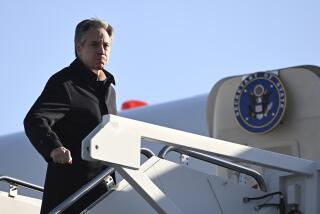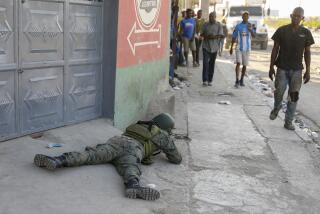Indonesia Declares Martial Law in E. Timor : Asia: Gangs, with apparent assistance of Jakarta’s military, continue to terrorize independence supporters. Nobel-winning bishop flees, half of U.N. staff is evacuated.
- Share via
JAKARTA, Indonesia — With even the national police chief calling the situation out of control, Indonesia imposed martial law in East Timor early today, transferring power from the province’s civilian governor to Jakarta’s army generals.
The declaration of martial law was seen as an attempt by the Jakarta government to convince the world that it was taking steps to control the bloodletting. But it might not greatly affect the situation on the ground because the province has, in effect, been under military control for 23 years, and the Indonesian army itself is being held responsible by most Western diplomats for masterminding the violence.
Indonesia’s armed forces chief, Gen. Wiranto, had pushed for the declaration after a four-hour visit to East Timor on Sunday but was turned down Monday in a plenary Cabinet meeting. The fact that he got his way indicates the weakness of Jakarta’s civilian government and the strength of the military in internal affairs, diplomats said.
On Monday, marauding anti-independence gangs took effective control of East Timor and its capital, forcing the United Nations to evacuate half its staff and Dili’s Roman Catholic bishop to flee for his life. “If the spiritual leader of a region is not respected, who else is?” asked the Jakarta Post in an editorial today.
The gunmen rampaged unchecked through the streets of Dili and other towns, shooting at Australian Ambassador John McCarthy, attacking homes, burning offices of Portuguese election observers and terrorizing refugees huddled at the Red Cross compound and in the gardens of Bishop Carlos Felipe Ximenes Belo’s home, later torched.
Witnesses said the Indonesian army had openly joined the militia’s terror campaign. Army soldiers were seen herding hundreds of refugees at gunpoint onto military trucks, to be driven to the neighboring province of West Timor, as the gunmen stepped up their campaign of political cleansing to rid East Timor of independence supporters.
Australia flew a fleet of C-130s to Dili and evacuated 204 U.N. staffers and other foreigners to Darwin. Belo, co-winner of the 1996 Nobel Peace Prize for his efforts on behalf of East Timorese independence, escaped on a police helicopter to Bacau, 70 miles from Dili, after the attack on his residence.
Human rights activists said it was impossible to confirm how many people in the province have been killed since the East Timorese voted for independence Aug. 30. Some reports placed the toll at 200 or more. Several towns, such as Maliana, have been razed and scores of villages emptied as thousands of residents have fled into the mountains or been forced out by anti-independence militias.
In Jakarta, the Indonesian capital, national Police Chief Roesmanhadi acknowledged that the militias had the upper hand.
At U.N. headquarters in New York, five representatives of the Security Council--the ambassadors of Namibia, Malaysia, Slovenia and Britain and a diplomat from the Netherlands--met with Secretary-General Kofi Annan before departing Monday night on an urgent mission to Jakarta.
Their purpose was to deliver a message that the violence must end and that the mandate of the election must stand. The Indonesian government told the Security Council on Sunday that it welcomed the mission but would not allow it to visit Dili.
After the meeting, Annan said he had spoken with Indonesian President B. J. Habibie and been told that the option of martial law was “on the table.”
But, he said, “if the violence continues, then the international community will have to consider what other measures it can take to assist the Indonesian government.”
Annan added: “I condemn in the strongest possible terms today’s attack on the compound of the International Committee of the Red Cross and on the residence of Bishop Belo. I am also outraged that internally displaced persons are being forced into trucks and being taken away against their will by militia to unknown destinations.”
President Clinton spoke with Annan in the afternoon from a political picnic in Norfolk, Va., said Barry Toiv, a White House spokesman.
The president “expressed support for the secretary-general’s helpful engagement in this issue. They discussed ways to encourage Indonesia to do what is required to bring security to East Timor,” Toiv said.
The rampage in the province has effectively rid it of foreigners, save for a dozen journalists and 229 U.N. staffers besieged in their Dili compound. Western diplomats believe that this was the intent all along of the military-backed militias, which have rejected the U.N.-sponsored election. Nearly 80% of the registered voters opted for independence over continued ties to Indonesia.
Although the United Nations mission in East Timor had in effect been closed down, its chief, Ian Martin, remained behind Monday. U.N. officials declined to comment on reports that the remaining staff would be withdrawn. Australian troops in Darwin were on alert to enter East Timor to restore peace. It was unlikely that they would be dispatched without the approval of the Indonesian government.
The militias and their political supporters say the election was rigged--a charge denied Monday in Jakarta by the three judges from South Africa, South Korea and Northern Ireland who make up the electoral commission appointed by Annan. The U.N. staff that oversaw the balloting represented 70 nations.
“In the short term, militarily, the militias have won,” said a Western military attache. “But in the long term, politically, they lose because the international community is committed to respecting the results of the election, and that result is going to become the reality of East Timor.”
The militias’ opponents--a pro-independence guerrilla force known as Falantil--have observed a self-imposed cease-fire during the one-sided violence sparked by President Habibie’s surprise offer in January to give the East Timorese the choice of independence or autonomy within Indonesia. The former Portuguese colony was invaded by Indonesia in 1975 and annexed as a province the next year.
Although outnumbered by perhaps 4 to 1, the 700 or so Falantil guerrillas, a resourceful, disciplined force who have lived in the mountains for years and have fought Indonesia on and off since 1975, are considered militarily superior to the unruly and ill-trained militia mobs. But Falantil is reluctant to move as long as 14,000 Indonesian soldiers and 8,000 Indonesian police remain in the territory.
Western diplomats said Falantil’s armed wing has pressured the movement’s leader, Jose Alexandre “Xanana” Gusmao, for a go-ahead to resume military operations but that Gusmao has refused, hoping that the ballot process will prove successful and knowing that Falantil has been weakened by inadequate arms. Gusmao, who has served six years of a 20-year prison sentence for rebellion, was freed by the Indonesian government today. He has decided to not return to Dili for now, fearing for his life, Reuters news agency reported.
In Lisbon, the Portuguese government termed the U.N. response insufficient and said in a statement that the militias’ behavior “demonstrates the flagrant incapacity of Indonesian authorities to control the situation or to restore order in East Timor.”
Asian and Western military analysts here say that incapacity isn’t surprising because the violence is being orchestrated by army commanders, perhaps acting out of the chain of command, who do not want to see East Timor become independent.
The U.N. is preparing a report, the Sydney Morning Herald said, documenting through eyewitness accounts the military’s involvement. Leaked reports show that the military instigated the attack in which an unarmed American police officer on the U.N. staff was shot--he was flown to Darwin for surgery and will recover--and that Indonesian soldiers and police have changed uniforms and joined militia operations, the paper said.
Western diplomats believe that a key role in the terror campaign has been assigned to Kopassus, an elite special forces unit once supported with arms and training by the United States and Australia. It used to be commanded by a rogue general, Prabowo Subianto, the politically ambitious son-in-law of former President Suharto.
Prabowo, accused of widespread human rights abuses throughout Indonesia, was kicked out of the army last year and was last known to be living in Jordan. The network of allies he left behind includes, in East Timor, Maj. Gen. Zacky Anwar Makarim, the army’s head of intelligence, and Eurico Guterres, the baby-faced, longhaired anti-independence militia boss.
Times staff writer John J. Goldman at the United Nations contributed to this report.
More to Read
Sign up for Essential California
The most important California stories and recommendations in your inbox every morning.
You may occasionally receive promotional content from the Los Angeles Times.













